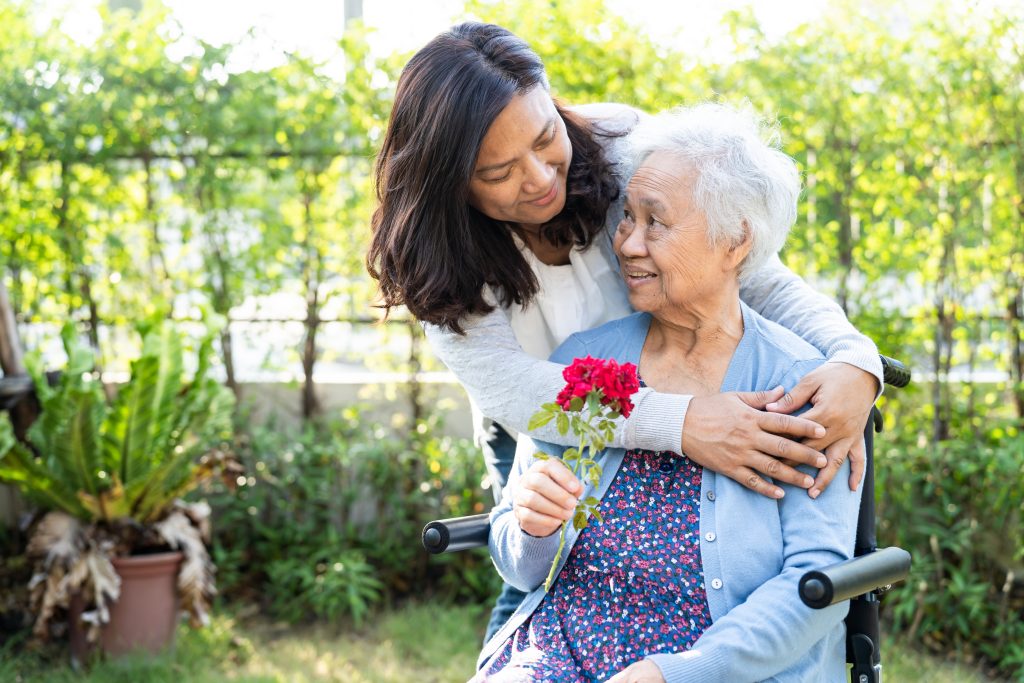




Dementia is used as a general term for the progressive deterioration of cognitive functions that are severe enough to interfere with daily activities and independence. Dementia results from damage to brain cells which disrupts the ability of brain cells to properly communicate causing thinking, behavior, and feelings to be affected. Alzheimer’s disease is the main cause of dementia but there are other causes such as Parkinson’s disease, stroke, head injury, etc.
There is no cure for most types of dementia but with proper medication and care, the progression can be slowed and a person’s quality of life can be improved. In this article we share 5 practical tips to help you deal with the difficulties of caring for a loved one with dementia.
Dementia can make it difficult for people to remember and recollect the words they are trying to say. This can make communication strenuous and cause feelings of frustration and anger. It’s important for you to be patient and use a gentle tone of voice to help your loved one remain calm. To make communication easier, try these tips:
Dementia impairs judgment and problem-solving skills, and as the disease progresses, risk of injury greatly increases. Some simple steps can improve safety around the home:
Dementia makes it difficult for people to handle stress, confusion, and change. To minimize agitation and conflict, keep a consistent routine for bathing, dressing, eating, and other activities. It’s also important to keep a person in their usual environment so they feel familiar, comfortable, and safe. Simplifying daily activities goes a long way towards reducing frustration, as well. For example, instead of purchasing pants that button up, opt for comfortable bottoms with an elastic waistband to make dressing easier. You can even lay out clothing items in the order they get put on to help your loved one become more familiar with their dressing routine and gain independence. Remember, a person’s capabilities may fluctuate from day to day, so be flexible and modify as needed.
People with dementia often have problems sleeping and as dementia progresses, sleep disturbances become worse and more frequent. This can be dangerous and cause problems for people with dementia because lack of quality sleep makes it difficult to think clearly. To help promote healthy sleep it’s important to create a restful environment.
When caring for someone with dementia, it’s easy to let your own physical and mental health slide. Don’t forget to take care of yourself. It’s incredibly difficult to take care of a loved one alone so it’s important to rely on others when needed. Don’t be afraid to ask for help or to be vocal and specific about what you need from others. Support groups like Alzheimer’s Association or the Family Caregiver Alliance allow you to share your experiences, coping strategies, feelings, and more with others who are facing similar caregiving challenges. It can be challenging to accept help or make time for yourself, but it’s necessary as a way to rejuvenate your energy so you can better take care of someone else.
Being a caregiver for a loved one with dementia can be extremely rewarding, but it can also be overwhelming. Dementia can be lonely for the person living with it and for the person providing care. Remember you are not alone and that there are many resources to help you better care for someone with dementia as well as care for your own wellbeing.
**The information on this site is not intended or implied to be a substitute for professional medical advice. If you are having a severe and sudden change in physical or mental health, please call 911, contact a local emergency facility or consult with your doctor. Always seek the advice of your physician or other qualified healthcare provider, and never disregard the advice given because of information you have received from our website.**




| Cookie | Duration | Description |
|---|---|---|
| cookielawinfo-checkbox-analytics | 11 months | This cookie is set by GDPR Cookie Consent plugin. The cookie is used to store the user consent for the cookies in the category "Analytics". |
| cookielawinfo-checkbox-functional | 11 months | The cookie is set by GDPR cookie consent to record the user consent for the cookies in the category "Functional". |
| cookielawinfo-checkbox-necessary | 11 months | This cookie is set by GDPR Cookie Consent plugin. The cookies is used to store the user consent for the cookies in the category "Necessary". |
| cookielawinfo-checkbox-others | 11 months | This cookie is set by GDPR Cookie Consent plugin. The cookie is used to store the user consent for the cookies in the category "Other. |
| cookielawinfo-checkbox-performance | 11 months | This cookie is set by GDPR Cookie Consent plugin. The cookie is used to store the user consent for the cookies in the category "Performance". |
| viewed_cookie_policy | 11 months | The cookie is set by the GDPR Cookie Consent plugin and is used to store whether or not user has consented to the use of cookies. It does not store any personal data. |